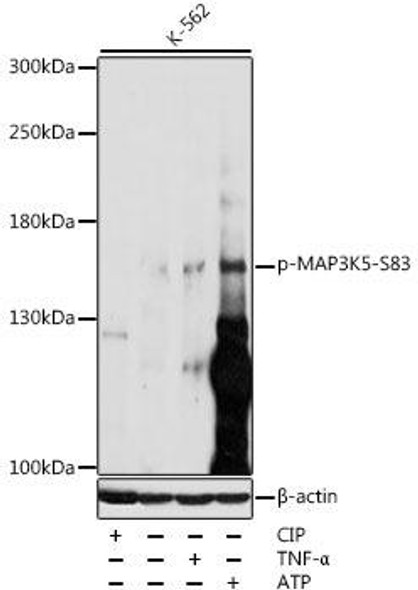Immunology Antibodies 3
Anti-Phospho-VIM-S83 Antibody (CABP1119)
- SKU:
- CABP1119
- Product Type:
- Antibody
- Reactivity:
- Human
- Reactivity:
- Mouse
- Reactivity:
- Rat
- Host Species:
- Rabbit
- Isotype:
- IgG
- Antibody Type:
- Polyclonal Antibody
- Research Area:
- Immunology
Description
| Antibody Name: | Anti-Phospho-VIM-S83 Antibody |
| Antibody SKU: | CABP1119 |
| Antibody Size: | 20uL, 50uL, 100uL |
| Application: | WB |
| Reactivity: | Human, Mouse, Rat |
| Host Species: | Rabbit |
| Immunogen: | A phospho specific peptide corresponding to residues surrounding S83 of human VIM. |
| Application: | WB |
| Recommended Dilution: | WB 1:500 - 1:2000 |
| Reactivity: | Human, Mouse, Rat |
| Positive Samples: |
| Immunogen: | A phospho specific peptide corresponding to residues surrounding S83 of human VIM. |
| Purification Method: | Affinity purification |
| Storage Buffer: | Store at -20°C. Avoid freeze / thaw cycles. Buffer: PBS with 0.02% sodium azide, 50% glycerol, pH7.3. |
| Isotype: | IgG |
| Sequence: | Email for sequence |
| Gene ID: | 7431 |
| Uniprot: | P08670 |
| Cellular Location: | Cytoplasm |
| Calculated MW: | 53kDa |
| Observed MW: | Refer to figures |
| Synonyms: | VIM, CTRCT30, HEL113, vimentin |
| Background: | This gene encodes a member of the intermediate filament family. Intermediate filamentents, along with microtubules and actin microfilaments, make up the cytoskeleton. The protein encoded by this gene is responsible for maintaining cell shape, integrity of the cytoplasm, and stabilizing cytoskeletal interactions. It is also involved in the immune response, and controls the transport of low-density lipoprotein (LDL)-derived cholesterol from a lysosome to the site of esterification. It functions as an organizer of a number of critical proteins involved in attachment, migration, and cell signaling. Mutations in this gene causes a dominant, pulverulent cataract.[provided by RefSeq, Jun 2009] |
| UniProt Protein Function: | Vimentin: an intermediate filament protein. Intermediate filament proteins are expressed in a tissue-specific manner. Desmin is the subunit specific for muscle and vimentin the subunit specific for mesenchymal tissue. |
| UniProt Protein Details: | Protein type:Cytoskeletal; Motility/polarity/chemotaxis Chromosomal Location of Human Ortholog: 10p13 Cellular Component: intermediate filament cytoskeleton; neuron projection; focal adhesion; cytoskeleton; cytoplasm; leading edge; plasma membrane; intermediate filament; peroxisome; cytosol Molecular Function:protein C-terminus binding; identical protein binding; protein binding; structural constituent of cytoskeleton; double-stranded RNA binding; glycoprotein binding; structural constituent of eye lens Biological Process: Bergmann glial cell differentiation; viral reproduction; apoptosis; intermediate filament organization; cell motility; astrocyte development; cell structure disassembly during apoptosis; muscle filament sliding Disease: Cataract 30 |
| NCBI Summary: | This gene encodes a type III intermediate filament protein. Intermediate filaments, along with microtubules and actin microfilaments, make up the cytoskeleton. The encoded protein is responsible for maintaining cell shape and integrity of the cytoplasm, and stabilizing cytoskeletal interactions. This protein is involved in neuritogenesis and cholesterol transport and functions as an organizer of a number of other critical proteins involved in cell attachment, migration, and signaling. Bacterial and viral pathogens have been shown to attach to this protein on the host cell surface. Mutations in this gene are associated with congenital cataracts in human patients. [provided by RefSeq, Aug 2017] |
| UniProt Code: | P08670 |
| NCBI GenInfo Identifier: | 55977767 |
| NCBI Gene ID: | 7431 |
| NCBI Accession: | P08670.4 |
| UniProt Related Accession: | P08670 |
| Molecular Weight: | |
| NCBI Full Name: | Vimentin |
| NCBI Synonym Full Names: | vimentin |
| NCBI Official Symbol: | VIM |
| NCBI Protein Information: | vimentin |
| UniProt Protein Name: | Vimentin |
| Protein Family: | Vimentin |
| UniProt Gene Name: | VIM |
| UniProt Entry Name: | VIME_HUMAN |






